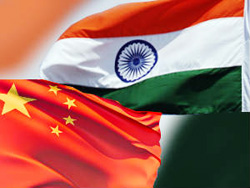Beijing, Oct 8: China today sharply reacted to India and the US expressing concern over the South China Sea dispute during Prime Minister Narendra Modi's visit to Washington, asserting that the maritime row should be resolved directly by parties concerned and no third party should meddle in it.
"Our position is that the dispute in the South China Sea should be resolved by countries directly concerned through negotiations and consultations. Any third party should not be involved in this," Chinese Foreign Ministry spokesman, Hong Lei told a media briefing.
He was reacting to the Indo-US joint statement issued at the end of Modi's meeting with President Barack Obama on September 30 which for the first time made a direct reference to the South China Sea dispute.
The reaction came late as Chinese Foreign Ministry formally reopened today after a week-long National Day holiday starting from October 1.
In his cautious comment on the issue, Hong merely reiterated China's long standing position on the outside intervention on the maritime dispute involving Beijing and several other countries in the region including Vietnam, the Philippines, Malaysia and Brunei besides Taiwan.
Though the joint statement did not make direct reference to China, it came as a surprise here as South China Sea dispute directly figured for the first time in India-US discourse in the backdrop of New Delhi and Washington expanding their sphere of influence in the Southeast Asia region.
The Indo-US joint statement had said, "The leaders expressed concern about rising tensions over maritime territorial disputes, and affirmed the importance of safeguarding maritime security and ensuring freedom of navigation and over flight throughout the region, especially in the South China Sea."
Earlier, China also struck a firm stand on India-Vietnam agreement to enable ONGC Videsh to explore two more oil wells in South China Sea signed during the recent visit of President Pranab Mukherjee to Hanoi, saying it will not back such a deal if it falls in the area administered by it.
China claims over 90 per cent of the resource-rich South China Sea as its own.





Comments
Add new comment